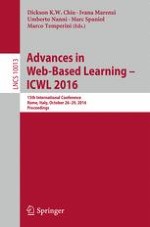2016 | OriginalPaper | Chapter
Towards Mobile Assisted Language Learning Based on Computational Thinking
Authors : Ilenia Fronza, Daniel Gallo
Published in: Advances in Web-Based Learning – ICWL 2016
Publisher: Springer International Publishing
Activate our intelligent search to find suitable subject content or patents.
Select sections of text to find matching patents with Artificial Intelligence. powered by
Select sections of text to find additional relevant content using AI-assisted search. powered by
